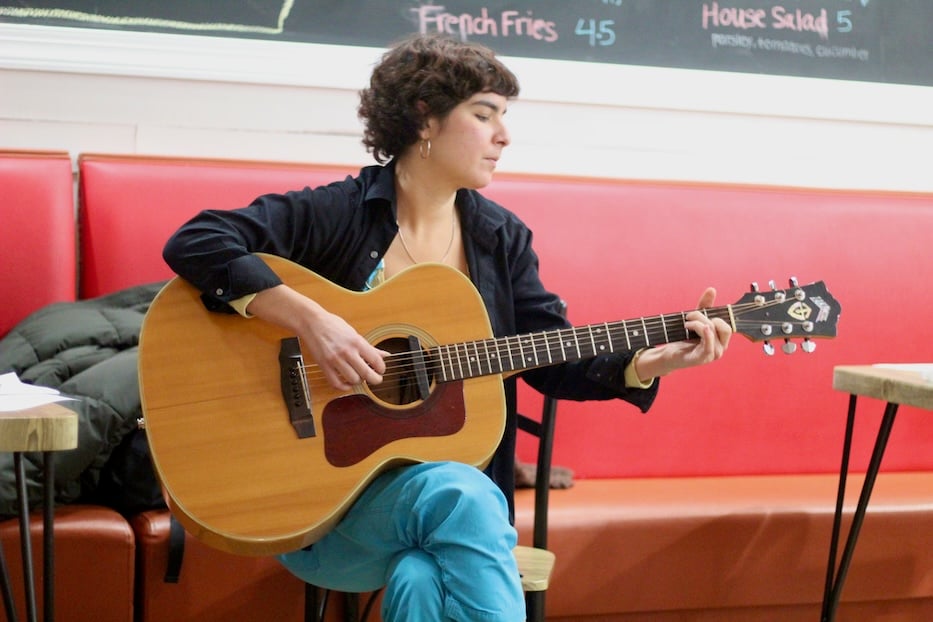
Culture & Community | Downtown | Food & Drink | Music | Arts & Culture | Havenly
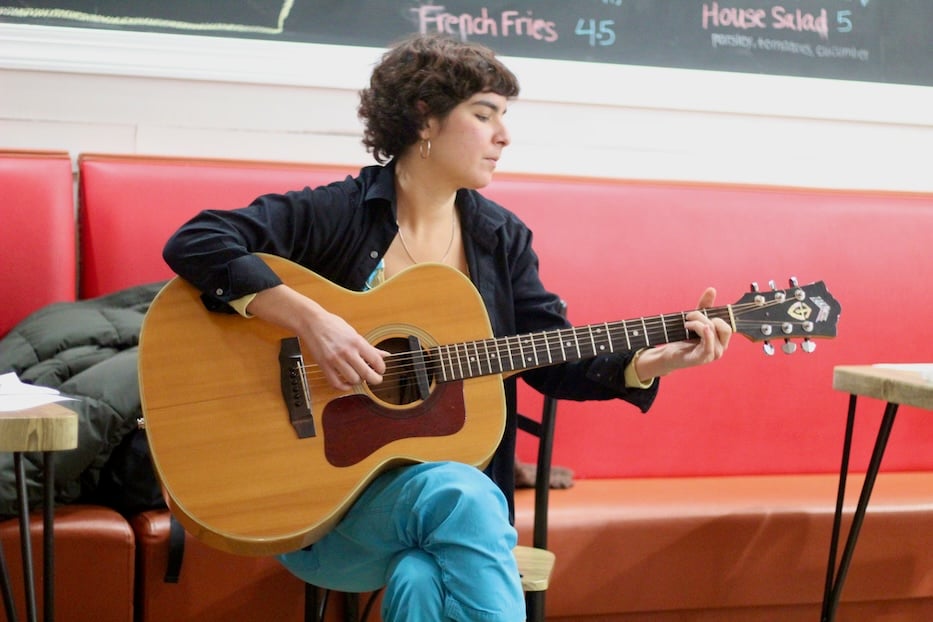
Miriam Elhajli. Lucy Gellman Photos.
Miriam Elhajli's voice filled Havenly, a guitar still on her lap as "The Wagoner's Lad" rose through the space. Behind her, a chalkboard menu told a story of diaspora and displacement one dish at a time. An attendee opened the door to head back out into the night, and the sound spilled out onto a rain-soaked Temple Street. Back inside, Elhajli closed her eyes and wished for an end to violence, from the U.S. to Venezuela to Israel and Gaza.
Sunday evening, that sound came to Havenly at 25 Temple St. as part of "Food for Thought," a new series from the Rich Arts Collective that blends artmaking, music, and dialogue as a way to foster learning and cross-cultural exchange. While the series was originally slated to begin in the spring of next year, founder Thabisa Rich said that the Israel-Hamas war and humanitarian crisis unfolding in Gaza pushed her to find a sooner date. Close to two dozen attended, many staying for an intimate concert from Elhajli at the end of the night. Presenters also included artists from Black Haven and singer-songwriter Ro Godwynn.
The timing struck a chord for Rich: Sunday marked Human Rights Day, on which the United Nations (U.N.) marked the 75th anniversary of the Universal Declaration of Human Rights (UDHR). It came two days after the U.S. voted against a U.N. resolution for a ceasefire in the Gaza Strip. Over 17,700 Palestinian people, the majority of them women and children, have been killed, according to the Gaza Health Ministry; another 1.8 million have been displaced. That follows roughly 1,200 Israeli deaths and 240 hostages taken in Hamas’ Oct. 7 attacks.
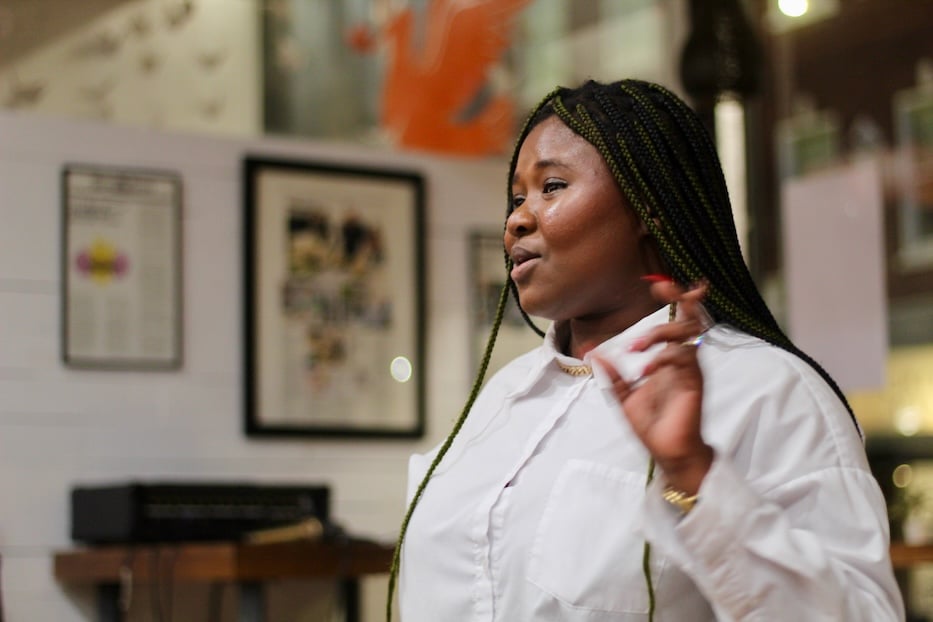
Thabisa Rich: "This is what we're doing: dreaming in action."
"What this tells me is we care," said Rich, who launched the collective in a celebration at NXTHVN earlier this year, and has been speaking out against the Israel-Hamas war almost daily on social media and in person. "We want to do better for ourselves, we want to do better for our people, we want to do better for this world. As we all know, everything is connected. This is what we're doing: dreaming in action. And for you to be here, you are making it a reality."
That connection echoed across the space, from a makeshift stage to a back countertop where Havenly fellows set out trays of hummus, tzatziki, cucumber salad, falafel and vegetable-studded maqluba over fragrant basmati rice. As rain pummeled the street outside, drummer Brian Jawara Gray brought the room to attention, a djembe propped between his knees as his palms began to take flight. Beneath his left armpit, he tucked a second hand drum just in case he needed it.
In the audience, conversations fell to a hush almost instantly. As he played, Gray tossed a drumstick to the floor, both hands hammering out an invitation. Atop the djembe, his hands rolled and undulated through the air, ringing the audience into being. Cheers, first tentative and then nearly musical, began to multiply across the space. Only when the musician had finished, bowing his head with gratitude, did the room burst into applause.
Gray, who grew up in New Haven and now is raising his sons in the city, said that performing Sunday felt natural for him: he is devastated by the loss of human life that he sees each time he turns on the news. Decades ago, he first learned about Palestine through the late George Edwards, a Black Panther whose service to New Haven included education and speaking out until the very end of his life.
Back then, Gray said, he was still in high school, and just becoming aware of the wider world around him. In New Haven, he could see the havoc that drugs, particularly heroin and later crack, were wreaking on the city's Black community members. So when Edwards took him back to the Panther's offices on Dixwell Avenue and Admiral Street, he originally thought it was to learn self-defense from one of his role models.
Instead, Edwards placed a pile of books in Gray's hands. The first title had black-and-white pictures of Palestinians and a description of the Nakba, or the forced migration of nearly a million Palestinians from their homes in 1948. Gray was struck by both the pain and sense of kinship he felt for and with the people he was reading about, half a world away.
"That's my passion for coming here and giving my input," he said, adding that he channels most of his language into the drums, and trusts that the audience will receive it. "What do you do? In this country, we're still recovering from that devastation. So yes, I feel [a sense of] camaraderie with people all over the world. It's not a Black thing. It's a people thing."
As she nibbled on rice and vegetables, attendee Patricia Duff said she'd also come out because she is distressed by what she sees happening in both Israel and Gaza. As a student in Women's and Gender Studies at Southern Connecticut State University (SCSU) and resident of Beaver Hills, home to a large Orthodox Jewish community, she described the situation as deeply upsetting, with both Israeli and Palestinian lives and futures hanging needlessly in the balance.
"For me, it's just heart wrenching, on both sides," she said. "The Prime Minister [Benjamin Netanyahu] and Hamas are creating all the problems. It's not the people. All of this division between people, on one side or the other, it doesn't make sense to me. It's not the people doing this. And the stories from Gaza give me nightmares."
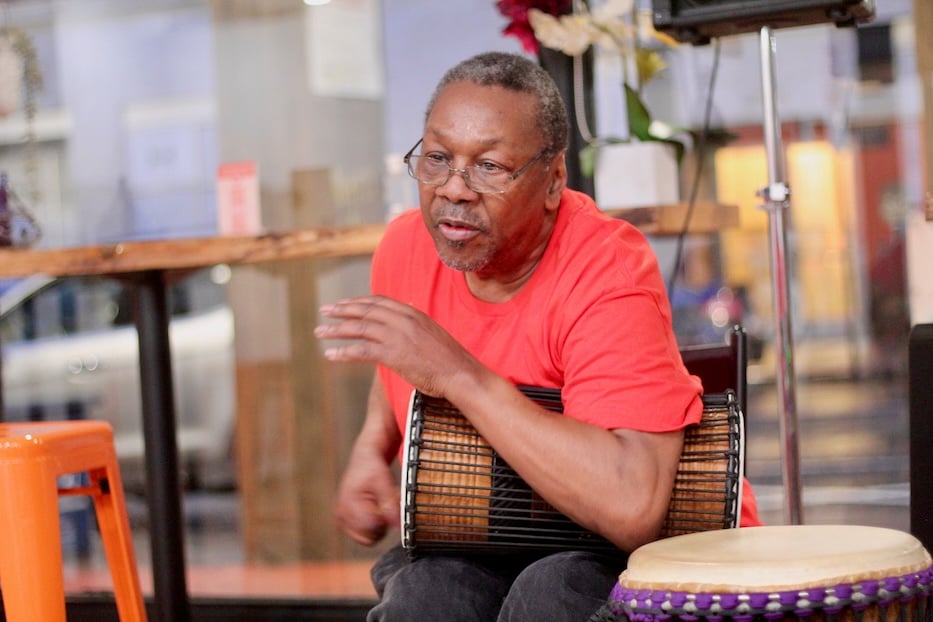
Brian Jawara Gray.
She added that it reminds her of how pervasive and insidious oppression, and the marking of a certain group of people as less than human, can be. Before she was ever a student at SCSU, Duff was a nurse in California, where she worked closely with some of the first patients diagnosed with HIV and AIDS in the 1980s. During that time, she said, she saw how families pulled away from their loved ones, motivated by both fear and their own ignorance.
It pushed her to start practicing Unitarian Universalism and Buddhism, both of which she still subscribes to today.
"I've seen vile oppression and discrimination of people," she said.
"We Can Build With Them Together"
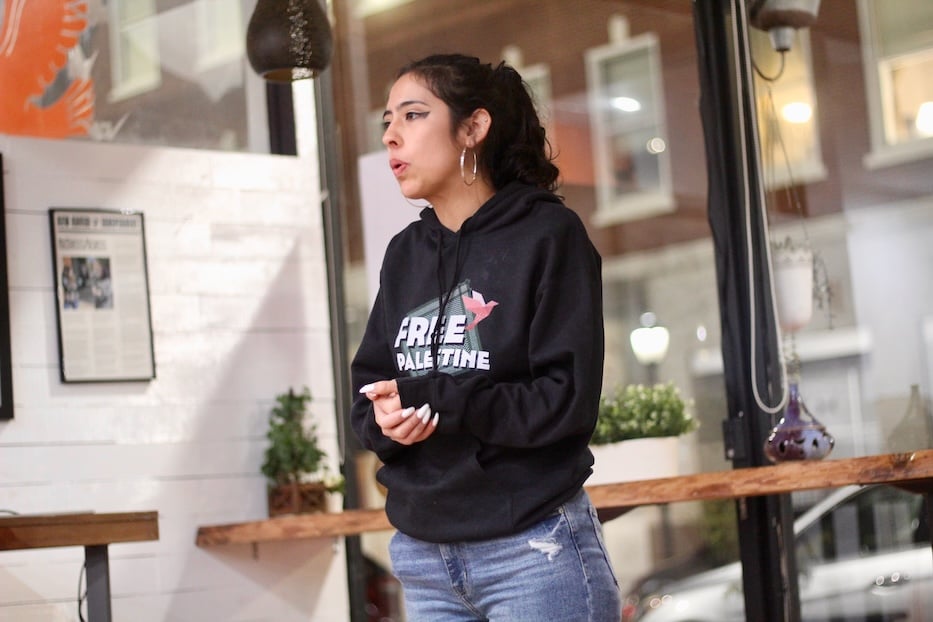
Camila Güiza-Chavez, co-executive director at Havenly.
In a classroom down the hall, that exchange continued as Camila Güiza-Chavez, co-executive director at Havenly, pulled up maps that traced the displacement of Palestinians from their land from 1917 to 2020. Across five images, a swath of solid, lush green land became smaller and smaller, shrinking to two smudges of color in the present.
That first 1917 date marked Great Britain's introduction of the Balfour Declaration, which promised a national homeland for the Jewish people a year before the end of the First World War. Over time, she said, it resulted in the forced removal of Palestinian people from their land. At the time, Güiza-Chavez added, any mention of "Palestinians" already included Palestinian Jews, as well as Christians and Muslims.
Over a century and decades of conflict later, little of that land remains in Palestinian hands, she continued. The slide shifted, showing Israel's segregated road system and series of controlled checkpoints. A decade ago, it was this system that resulted in the deaths of six Palestinian schoolchildren and their teacher, who died after an 18-wheeler rammed into them on one such highway. It shifted again, to an image of Israel's separation wall rising over buildings.
"It's not a difference in religion that causes violence," she said, noting that there are and have long been Jewish people who believe that it is not anti-semitic to question the actions of a right-wing government like Netanyahu's. "It's a difference in access to power that causes violence."
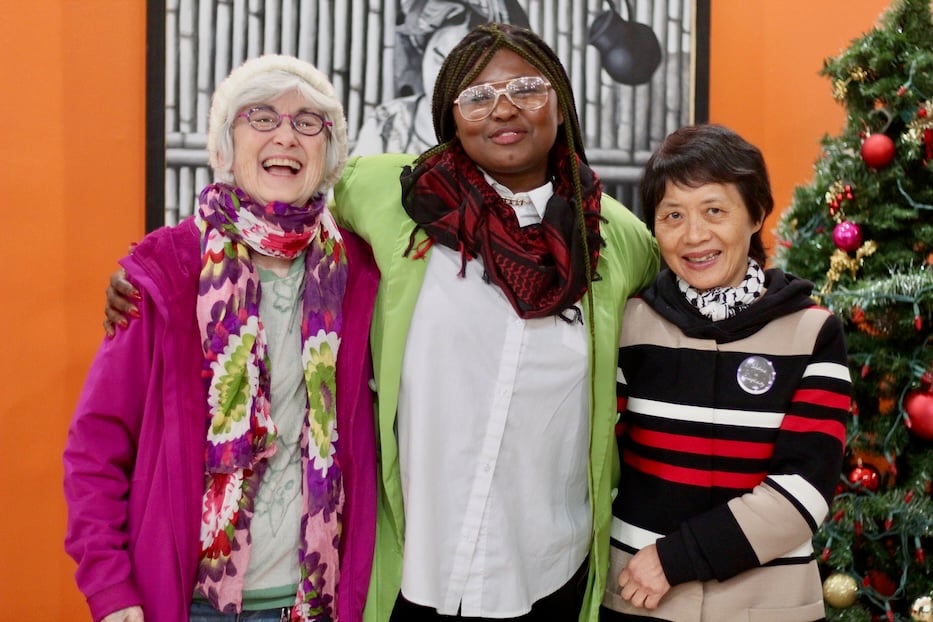
Patricia Duff, Thabisa Rich and Yi-Chun Tricia Lin.
Playwright Toto Kisaku, who had been largely silent, piped up from where he was sitting on the far side of the room in a clementine-orange chair. After coming to the United States from Congo as an asylum seeker in 2015, he recorded and shared his near-death experiences with audiences in Requiem for an Electric Chair. Now, he said, the crisis in Gaza makes him think of the ongoing war between Congo and Rwanda. As of the end of October, the U.N. reported that nearly seven million people had been displaced by that conflict.
"When I saw the different maps, that reminded me of what's going on in Congo right now," Kisaku said. "We have to make a difference ... the question we must ask is, do we build compassion or do we build power? We have to create strength in community."
"I don't think power and compassion should be exclusive," pushed back Yi-Chun Tricia Lin, professor and director of Women's and Gender Studies at SCSU. "We can build with them together."
Writer Ashleigh Huckabey said the maps had resonated for her as a Black woman in New Haven, and in America. When she saw them, she said, her mind went immediately to the legacy of slavery in the U.S., from Jim Crow and redlining to the economic disenfranchisement of Black Americans that continues today.
"It's ultimately going to come back to undoing racism and undoing that power," she said. "I can go down Dixwell Avenue and Whalley Avenue and see it every day."
"It Unlocked People's Minds"
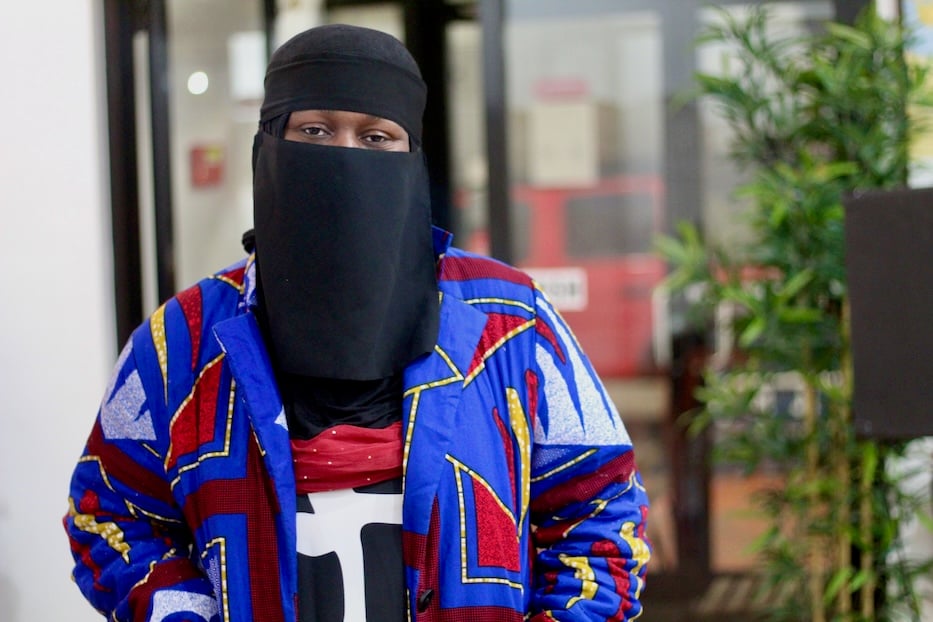
That also rang true for both Godwynn and another participant who asked not to be named, who highlighted the power of storytelling—and urged attendees not to give in to fear and propaganda—in humanizing people half a world away. Coming to the front of the classroom, she wound the clock back to her time in middle school, where the seventh and eighth graders had a poetry slam every year.
"I was young, dark-skinned, hijabi, and even though I was in a school full of Black and Brown kids, people would stop me and say, 'Are you really American?'" she started. "And I realized that poetry did something that just talking didn't do. It unlocked people's minds, and their hearts, and it took them on a journey."
That realization stayed with her for years, as she navigated high school, worked closely with the young poets of The Word, and later made the move to Los Angeles to work with Public Allies. After an unexpected return to New Haven during the first year of the Covid-19 pandemic, that belief in storytelling led her to found the Black Haven Film Festival.
"The quote for Black Haven that we came to is 'Storytelling as a tool for social change,''' she said. But at the beginning of the Israel-Hamas war, she found herself at a crossroads. She had just founded a nonprofit, and wasn't sure she was ready to come out "to publicly say my piece on the importance of uplifting the Palestinian struggle."
Ultimately, it was the silence of fellow creatives, who were continuing on with business as usual, that motivated her to speak up. Looking around the room, she encouraged fellow attendees—among them writers, potters, photographers, vocalists and poets—to speak up for what they believe in, even amidst the fear of rejection or retaliation.
"We're seeing the genocide of a people, but we're also seeing the genocide of a culture," she said. "We're seeing the genocide of those stories. Not only are the people being erased, but the churches are being erased. The mosques are being erased. The museums are being erased, the archives ... thousands of years."
"The olive trees, thousands of years old," added Lin.
"Trees! Thousands of years-old trees," she said. "The very thing that makes our art so phenomenal—it could be a splat of paint on the wall—but the story behind it, that's what touches people."
"We can't have true belonging and community if we're going to disagree on if somebody is worthy of human life," she continued. "Particularly and especially a child."
Nowhere, perhaps, was that message clearer or more mellifluous than the end of the evening, as both Godwynn and Elhajli closed attendees out with an intimate concert. Performing their 2021 song "Intervene,” Godwynn eased the audience into a groove, vocals bathing the space in something ethereal. Swaying to the sound, they reminded attendees to remain as open-hearted as they could after they left the space.
"When we are taught to be afraid of something, it makes us hesitant to act," Godwynn had said just moments before in the classroom down the hall. "It's important to stand up for what is right and let Palestenians know that they are far, far, far from alone."
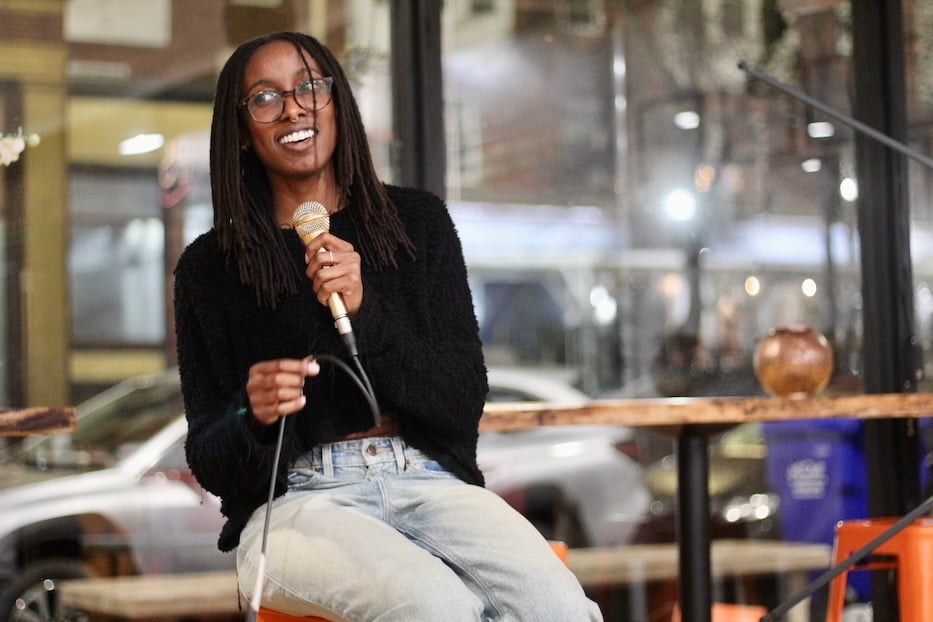
Ro Godwynn, who helped bring the evening to a close.
Elhajli, who is Moroccan, Venezuelan, and American, closed out the evening with a call for intersectionality, weaving a musical thread from Appalachia to Argentina to Minneapolis to Venezuela and back again. As her voice filled the space, pressing up to the ceiling and spilling over the countertops, she criss-crossed borders and time periods, as if no geographic boundaries stood in her way. For the dozen or so attendees who had remained in the space, it was hypnotic.
Before closing with the folk tune "Pajarillo verde," Elhajli remembered her grandmother, a folk singer in Venezuela. "As someone who has dedicated their life to immaterial wealth," the singer thinks about what people are able to carry with them when they are displaced. Often, she said, that's memory.
As she packed up for the night, Rich said that she plans to continue speaking out, and now feels that she has new allies who will join her. She added that she did not see the event as political, so much as a chance for artists to gather, grieve, and talk together in a safe space. For her, she said, that's what the arts and humanities are about.
"It is my duty as an artist to represent what is happening in the world," she said. "We [the Collective] saw a need. People are crying. People are feeling all sorts of hurtful ways, in all directions. In all directions. And this was us taking a bold step forward to actually serve the community."

